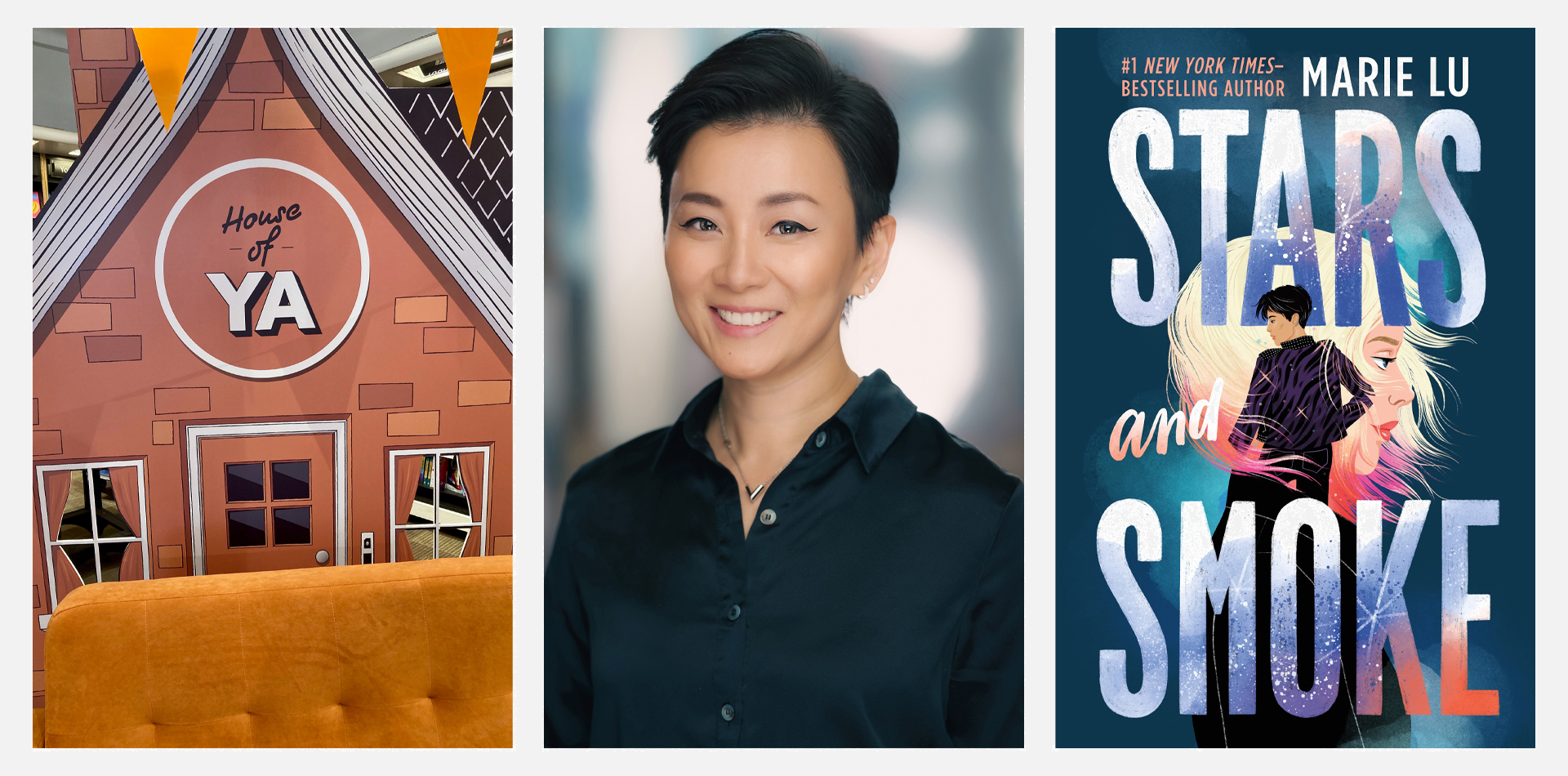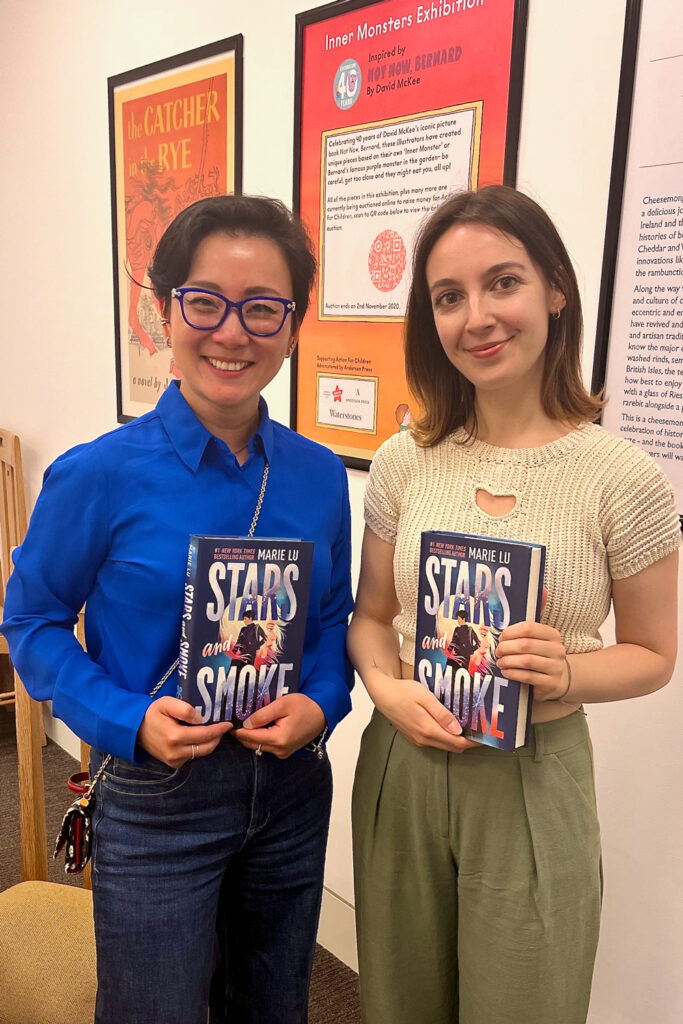From August 15th to the 18th Penguin’s House of YA x Waterstones BookFest was on tour around the UK. The event was first and foremost a celebration of young adult novels and authors. Young adult, commonly known as YA, is a category of fiction literature typically aimed at readers between 12 and 18 but loved by people of all ages. Starting off in Newcastle before heading to Manchester, London then ending in Norwich the festival was filled with goodies, games and the chance to meet some of the most loved YA authors of today. On August 17th at Waterstones Piccadilly I had the pleasure of attending the “In My Lover Era” panel where Marie Lu (Legend series, Stars and Smoke), Beth Reekles (The Kissing Booth, The Summer Switch-Off), and Jenny Ireland (The First Move) discussed their latest releases, dished about their favourite romance tropes and gave us an insight into their writing processes. Prior to the panel I also had the honor of interviewing Marie Lu. Marie Lu is a #1 New York Times bestselling author whose debut series, the “Legend” trilogy, made her a must read author for fans of YA. Her latest book “Stars and Smoke”, which was released this past March, is the perfect summer read for those who love both romance and action. Keep reading to learn more about Marie Lu!

As today’s event is a celebration of all things YA, what inspired you to want to write for young adults specifically?
Marie: I didn’t know I was actually writing for young adults when I wrote “Legend”. I had pitched that story to my agent as sci-fi and wasn’t quite aware yet that YA was its own category. This was back in 2010 and “The Hunger Games” had just taken off. So when I gave [“Legend”] to my agent she was the one who told me that it actually slots very neatly into YA sci-fi, so I was like great! And then from then on I started to read a lot of YA and started to understand the genre that I was in and I really loved it. I love that YA as a category is not afraid to tackle a lot of topics that aren’t tackled in other categories of fiction. It has a lot of hope embedded in their stories as well. I love a lot of adult fiction but they tend to be darker and a little bit more depressing and tend to have endings that are not always happy. I think in YA there is a lot more optimism and the feeling that you can change things if you try and if you live in a dark world that it’s not completely hopeless.
That’s very true that there’s a strong sense of hope in YA, and that’s especially evident nowadays with the memory of the pandemic being very fresh. Would you say that hope, amongst other factors, is something that makes YA books appealing to other age demographics as well?
Marie: Yeah absolutely. I think people never really grow out of that feeling of coming of age or of changing as you grow, learning how to be a new person and adjusting to new things. I think those are a lot of the themes that are covered in YA as the characters age from children into adulthood. For a lot of us that time of our lives was so foundational to who we are as people. We can all remember that very very viscerally and there’s something accessible and cathartic about reading YA because it takes you back to a time where everything was new, everything was changing, everything feels so intense and immediate. A lot of people have really enjoyed getting in touch with that and matching it to their current lives and what’s changing in them.
Later you’ll be appearing in the “In My Lover Era” panel where you’ll be talking about romance and other swoon-worthy topics. Especially in your latest book, “Stars and Smoke”, even though it’s a spy thriller the romance is an important part of it too. What are some of your favorite romance tropes?
Marie: I love tropes, I can never get enough of them! I love the trope of enemies to lovers, I’m constantly tackling that in all of my books. There’s just something really delightful about people that hate each other, or think that they hate each other, who then end up loving each other in the end. I also love grumpy and sunshine, I think that’s such a fun pairing! Or grumpy and anyone. There’s so many! I also love those moments when one of the characters is sick or vulnerable and has always had a wall up against the other person for whom they’ve had feelings for but have never revealed it, and then eventually they reveal it in a moment of vulnerability. I love those types of moments in the story. There’s just so many I could go on and on.
On the other hand what are some tropes that you are not a fan of?
Marie: I don’t know if there’s a trope that I can’t get past. I guess there are some that I don’t gravitate towards as much as others, but I think that any trope can be made enjoyable because there are just so many different ways that you can implement them. So I won’t put my foot down on any of them.
Is there a trope or aspect of romance novels that you’d like to put your own spin on in a future book?
Marie: Well I’m tackling this in the next “Stars and Smoke” book: former flames coming back into the picture, so exes to lovers. Another one I’d like to tackle is childhood friends to lovers. Or even better- childhood friends to enemies to lovers, that’s one of my favorites! I’m actually working on an adult book that has some of that in it.
I didn’t know that “Stars and Smoke” was going to be a series! Is this a little spoiler for what’s to come?
Marie: I hope it’s not a spoiler! Each book stands alone. It’s technically a series but it’s a little bit like watching “Supernatural” where you don’t necessarily need to know everything to understand and enjoy the episodes themselves. There’s a real ending in “Stars and Smoke” and the next book will also be structured in a way where you don’t necessarily need to read [the first] “Stars and Smoke” to understand the next book.
Your stories take place all over the world, although often these worlds are fictional, from LA to Tokyo and most recently London. You’ve also mentioned how representation, specifically Asian American representation, and diversity are things that are very important to you, especially in conversations regarding one of the protagonists of your latest novel, Winter Young, who is Chinese American. How does your identity being Chinese American influence your writing- is your background something that you make a conscious effort to include in your stories or something that is naturally embedded?
Marie: That’s a complex question because when I first began writing, this was back in 2010 when “Legend” sold, at that time there was very little diversity that existed in YA let alone in the rest of fiction. I remember feeling very uncertain about how much of myself I could put into a story. I think when I approach a story I do naturally want to put myself in it. But when I was a teenager growing up there was very little fiction that featured Asian characters, of any capacity, in the story. So because I never saw that in fantasy and science fiction it never occurred to me that that was ok to put into the story. I didn’t know that I could exist in stories of science fiction and fantasy. And I actually didn’t read a story featuring an Asian American protagonist until Cindy Pon’s “Silver Phoenix”, which came out in the 2000s. By then I was already an adult and that was the first time I saw it. So when I first started publishing it was a decision that made me feel very insecure, to put aspects of my childhood and my culture into the story, because I felt like if I were to be authentic to myself does that relegate me to obscurity? Does that end my career? Does that put me only on diversity panels or get stuck in the section of the bookstore that’s just about diversity? And then if I want a career do I have to erase myself from stories? That was a very real fear for not just me but for a lot of diverse authors that I knew at the time who were trying to break in. I owe a lot to Asian American authors who came before me who have opened the path. Jenny Han was a huge author who paved the way for a lot of fellow Asian American authors. Cindy Pon and Malinda Lo too. [Seeing] That gave me the courage to slowly put pieces of myself into stories. If you look at my stories as the years went on there were more and more pieces of myself that started to appear in them as I became braver. Today fiction still has a long way to go but it’s a very different landscape now than ten years ago and that’s been very encouraging to see. I hope that means that I’m braver moving forward and other authors also feel like they can put themselves in their stories without fear.

As a reader I love reading from a diverse range of authors and stories as I feel like even though the story might tackle a culture or identity that is different than mine the themes are universal and I’m always able to find something to relate to. In the future, what aspects of your identity or your culture are you excited to get to share with your readers?
Marie: I have a lot of that coming up in my adult novel, which hasn’t been announced yet so I can’t say too much about it, but I’m really excited and kind of intimidated. There are some parts [about] my life early on when we had first come to the States. We grew up with not a lot of money and were quite poor when we came over. As children you don’t really know that, everything feels normal to you. I tackle a little bit of class structure in my adult novel [too], about the wide gap between the rich and the poor and about capitalism in the US specifically. And I mix it with a bit of magic. I’m very very excited about sharing that story.
As part of this BookFest tour you were previously in Manchester and are now here in London. In “Stars and Smoke” a lot of the action takes place in London and you even name drop a few places like Kew Gardens and Alexandra Palace. What drew you to picking London as the setting for your latest book? Was it London or the story that came first?
Marie: First of all I absolutely adore London, I think it’s one of my favorite cities in the world. My husband and I have come over here over the years as much as we can. I love everything about it. I love how it feels like the crossroads of the world. One thing that was specific about “Stars and Smoke” was that I began that story in March 2020, so it was my pandemic book. That was when lockdown happened and everything was crazy, we were sanitizing our vegetables because we didn’t know what was going on. The news was so awful and we couldn’t go anywhere. I was stuck in my room just like everybody. And that feeling of isolation was so overwhelming. As a writer I’m fairly used to being in a cave like that but it’s by choice. This was the first time that I felt cut off from the world. So a lot of the inspiration that came from writing “Stars and Smoke” was the need to get out, the need to travel. Of course the first place I thought of was London. I was like if I can’t go overseas then my characters will go! So I sent them off on a mission to London and vicariously experienced through them visiting some of my favorite places in the city.
You’ve written books in a variety of genres, many that take place in dystopian or fantasy worlds, but “Stars and Smoke” takes place in our world though a “shadow” one as it deals with spies and underground operations. What were some of the challenges of placing your book in a contemporary setting and not a fictional one?
Marie: I had so much trouble with it! This is my first time writing contemporary. I’m so used to escaping from reality by writing fantasy and science fiction, but because I was writing this in 2020 I felt like writing fantasy and sci-fi was not an escape anymore because the world had become so strange. I felt like I needed to escape into contemporary in a way, in a version of our world where the pandemic didn’t exist. That was the impetus for it. But I found it so difficult, because the beauty of the best contemporary [novel] is that there is a lot of world building in it but you have to make it feel like it belongs in the real world, and that’s such a challenge. Some of my favorite contemporary books that I read are able to build their own world inside another one that’s real, like London or LA or New York. They make it feel like “oh! this has always been here”: this street or this store, this character’s home, their neighborhood. They add in all these little tiny details about the names of the stores and the names of their friends and the way that they talk. It has to feel authentic to that place. I’ve always admired that and been very intimidated by that because it’s a very different kind of world building than we do in fantasy and sci fi where you can kind of do whatever because it’s yours. That has its own challenges but contemporary really has to feel grounded in something. I found that very difficult when I was writing “Stars and Smoke” because I couldn’t just put dragons in there, I had to make it feel like this is a street in London, they would have a party here, they would take this route if they wanted to do this or that. There’s a scene towards the end that’s set in the Victoria and Albert Museum and I wrote that chapter originally when I was in the States during lockdown. I was on Google Maps trying to piece together where things were and I was like this feels right. Later on when I could travel to London I went to the V&A and I think I freaked out all the guards because I was looking at security cameras and where the windows were. They were like “she’s not looking at the art collection what’s happening”. And then I had to go back and delete the whole thing! Everything was wrong, I had to redo that chapter completely. So I definitely found it to be a challenge.
Previously you worked in the video game industry before becoming a published author. Though both books and video games have important storytelling elements the medium of video games is very visually driven. Has your background in video games influenced your writing? And if so, how?
Marie: I think it did. I kind of fell into video games by accident, I thought I was going to be a lawyer when I was in college- it’s for the best that I didn’t I would have been a terrible lawyer! I’ve always loved video games. I’ve always been a visual thinker and I love that games are also another form of storytelling but in a very visual medium. It was most evident in my book “Warcross”, which is about video games. I just see the world as a 3D environment almost and when I write I kind of imagine as if you’re a player in this game [and] video games are kind of like watching a movie, except you control what’s happening. It definitely influenced how I picture my scenes and my chapters, where the characters go and how they interact. I tend to see it playing out as a game in my head.

To wrap up this interview on a fun note, you’ve mentioned how you’re a fan of BTS. In fact you’ve also mentioned how Winter Young [one of the protagonists of “Stars and Smoke”] is inspired by BTS and Kpop artists. I know it’s tough but what is your favourite current BTS or Kpop song?
Marie: It’s constantly changing for me but I love BTS’s “Black Swan”, that is one of my favourite BTS songs. I didn’t expect it to be, because it felt very personal as it’s about their artistic journey. but I love that song it’s great. Jimin is my bias so I loved his new album, I love “Like Crazy”. And I love Yoongi too, so “Daechwita” and “Haegeum” are two of my current favorites too.
Thank you so much to Marie Lu for chatting with me about her background and her books! Her latest book “Stars and Smoke” is available in bookstores everywhere and online as an eBook.
Interview by Dafne Mistrangelo

